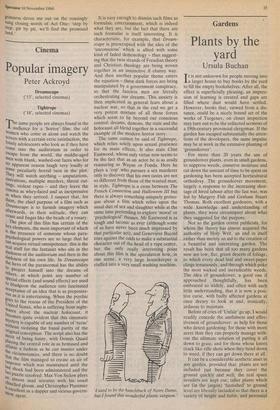Cinema
Popular imagery
Peter Ackroyd
Dreamscape ('15', selected cinemas) Tightrope (1 8', selected cinemas)
Tile same people are always found in the audience for a 'horror' film: the old Women who come in alone and watch the screen with a certain eerie satisfaction, the lonely adolescents who look as if they have come into the auditorium in order to escape from the world, the middle-aged Men with blank, washed-out faces who for n° apparent reason laugh very loudly at SOMe peculiarly horrid turn in the plot. They will watch anything — amputations, e.astrations, multiple murders, throat cut- tings, violent rapes — and they leave the cinema as whey-faced and as inexpressive as when they arrived. I suspect that, for them, the chief purpose of a film such as Oreamscape is to furnish imagery which afterwards, in their solitude, they can count and finger like the beads of a rosary. The plot of this film has certain of the key elements, the most important of which IS the presence of someone whose para- PsYchological powers are so large that he an acquire virtual omnipotence: this is the real stuff for the fantasist who sits in the darkness of the auditorium and then in the darkness of his own life. In Dreamscape the hero of the paranormal has the ability t° project himself into the dreams of °thers, at which point any number of special effects (and sound effects) are used to bludgeon the audience into fascinated acceptance of an idea that is as preposter- °us as it is entertaining. When the psychic Pus to the rescue of the President of the united States, who is suffering from night- luares about the nuclear holocaust, it °ecomes quite evident that this cinematic Mystery is capable of any number of 'turns' wl.thout violating the banal purity of the erigmal conception. The script also has the Merit of being funny, with Dennis Quaid 13,,l!Ylog the central role in as bemused and ,`table a fashion as he can muster under ;Lite circumstances, and there is no doubt snat the film managed to create an air of insPense which was maintained until the last shock had been administered and the aast Puzzle resolved. Max Von Sydow plays 2. almost mad scientist with his usual 1iselled gloom, and Christopher Plummer ' excellent as a dapper and vicious govern- tnent agent. It is easy enough to dismiss such films as formulaic entertainment, which is indeed what they are, but the fact that there are such formulae is itself interesting. It is characteristic, for example, that Dream- scape is preoccupied with the idea of the 'unconscious' which is allied with some kind of faded demonology — thus suggest- ing that the twin strands of Freudian theory and Christian theology are being woven together in an instinctive if clumsy way. And then another popular theme enters the equation — these dark forces are being manipulated by a government conspiracy, so that the faceless men are literally orchestrating our dreams. This anxiety is then implicated in general fears about a nuclear war, so that in the end we get a very potent mixture of all those forces which seem to lie beyond our conscious control: dreams, demons, the state and the holocaust all blend together in a successful example of the modern horror story.
The same cannot be said of Tightrope, which relies solely upon sexual prurience for its main effects. It also stars Clint Eastwood, whose only virtue now seems to be the fact that as an actor he is as cosily reassuring as Wayne or Fonda. Here he plays a 'cop' who pursues a sex murderer only to discover that his own tastes are not so different from those of the wanted man; in style, Tightrope is a cross between The French Connection and Halloween III but there is always something uniquely grotes- que about a film which relies upon the usual diet of sex and slaughter while at the same time pretending to explore 'moral' or 'psychological' themes. Mr Eastwood is as tough and laconic as ever (although some of us have never been much impressed by that particular act), and Genevieve Bujold tries against the odds to make a substantial character out of the head of a rape centre, but the only really interesting point about this film is the speculation how, in one scene, a very large housekeeper is stuffed into a very small washing machine.
'I used to be the hunchback of Notre Dame, but I found this wonderful plastic surgeon.'














































 Previous page
Previous page